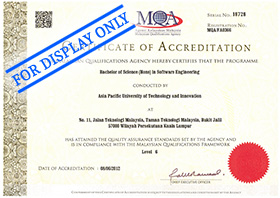You are here
Bachelor of Science (Hons) in Software Engineering

|
|
|
APU-DMU DUAL DEGREE PROGRAMME |
ADMISSION REQUIREMENTS
GENERAL REQUIREMENTS | |
| DIRECT ENTRY TO LEVEL 1 OF THE DEGREE: | |
| STPM | • 2 Passes in STPM in Science stream with minimum Grade C (GPA 2.0) in Mathematics and one Science or ICT Subject. |
| A-LEVEL Overseas qualification that are equivalent to 12th Grade/A Level/HSC are accepted. | • 2 Passes (Grade A-D) in A-Level in Science stream with a Pass in Mathematics and one Science or ICT subject. |
| UEC | • 5 Grade B Passes in UEC in any subject including Mathematics and one Science or ICT subject. |
FOUNDATION/ | • A pass in Matriculation or Foundation studies with minimum CGPA of 2.0 with a Credit in Additional Mathematics at SPM/IGCSE/O-Level or its equivalent. Note:The requirement for the Additional Mathematics can be exempted if the Matriculation or Foundation offers Mathematics module which is equivalent or higher requirement than the Additional Mathematics at SPM level.
|
| DIRECT ENTRY TO LEVEL 2 OF THE DEGREE: | |
| ICT RELATED DIPLOMAS | • Diploma with a minimum CGPA of 2.50. Note:Student with CGPA above 2.0 and below 2.5 may be accepted using rigorous assessment conducted by APU and subject to the approval of the Academic Board. |
Note:Students who do not have a Credit in Additional Mathematics in SPM/O-Level/IGCSE but have an acceptable achievement in Mathematics related subjects during the Foundation which may be equivalent to SPM/O-Level/IGCSE Additional Mathematics, can be accepted into Degree Programmes. Students can be given preferential entry for ICT related subject in SPM/O-Level/ IGCSE.
Any qualification that APU accepts as equivalent to the above.
The above entry requirements may differ for specific programmes based on the latest programme standards published by Malaysian Qualifications Agency (MQA). The qualification and entry requirements for the programmes will be determined based on the "Comparison List of Equivalency of International Qualifications with SPM (O-Levels equivalent) and STPM (A-Levels equivalent)" published by Malaysian Qualifications Agency (MQA).
| ENGLISH REQUIREMENTS | |
INTERNATIONAL STUDENTS | • IELTS : 5.0 |
PROGRAMME OUTLINE
This programme is specifically designed to provide students with:
- Familiarity with the tools and rigorous methodologies used to develop mission-critical and safety-critical software systems.
- The ability to critically evaluate design paradigms, languages, algorithms, and techniques used to develop large-scale and complex software systems.
- A deep appreciation of the importance of software architecture, testing, documentation, and maintainability.
DEGREE LEVEL 1 |
Students will learn fundamental skills required by every IT professional, and the basic understanding of programming, problem solving skills, algorithmic skills, mathematical techniques and systems analysis and design. Some specialised modules will provide students with basic knowledge of underlying computer systems such as Computer Architecture, operating systems, networking and databases. The modules will also help them develop personal and organisational skills, as well as nurture creativity and innovation.
COMMON MODULES | |
|
|
SPECIALISED MODULES | |
|
|
ELECTIVE MODULES (CHOOSE 1) | |
|
|
DEGREE LEVEL 2 |
A broader range of skills will be learnt, in which students will gain a better understanding of design paradigms, languages, and algorithms used for developing large-scale and complex software systems. They will gain solid understanding of software lifecycle, and methodologies for specification, design, development, testing, evaluation, analysis and maintenance of software systems. We will further nurture their creativity and innovation as well as independent learning to prepare them for the workplace.
COMMON MODULES | |
|
|
SPECIALISED MODULES | |
|
|
ELECTIVE MODULES (CHOOSE 1) | |
|
|
INTERNSHIP (16 weeks) |
Students will undertake an Internship/Industrial Training for a minimum period of 16 weeks to prepare them for a smooth transition from the classroom to the working environment.
DEGREE LEVEL 3 |
Students will make use of their previous studies and industrial experience to extend their familiarity in the field of software engineering and to refine their personal and professional development. Students will move further into system design methods that help them improve on software design, organisation and maintainability to produce concise and powerful software applications. A final year project requires them to investigate and develop a solution for a real-world problem - they will demonstrate their ability to combine technical knowledge, critical thinking and analytical skills to produce a personal achievement portfolio.
COMMON MODULES | |
|
|
SPECIALISED MODULES | |
|
|
ELECTIVE MODULES (CHOOSE 2) | |
|
|
MQA COMPULSORY SUBJECTS* |
|
|
(*All students are required to successfully complete these modules as stipulated by the Malaysian Qualification Agency.) | |
CAREER OPTIONS
|
|
COURSE FEES
Malaysian Students | International Students |
Year 1: RM 32,900 | Year 1: RM 33,600 (USD 7,815) |
* Fees stated here do not include Deposits and other Miscellaneous Fees. Please refer to Fee Guide for details.
MQA ACCREDITATION
(R2/0612/6/0013)(04/26)(MQA/FA0366) |
Computing & Technology Degree Programmes |
- Bachelor of Science (Honours) in Information Technology
- Bachelor of Science (Honours) in Information Technology with a specialism in Information System Security
- Bachelor of Science (Honours) in Information Technology with a specialism in Cloud Engineering
- Bachelor of Science (Honours) in Information Technology with a specialism in Internet of Things (IoT)
- Bachelor of Science (Honours) in Information Technology with a specialism in Digital Transformation
- Bachelor of Science (Honours) in Information Technology with a specialism in Financial Technology (FinTech)
- Bachelor of Science (Honours) in Information Technology with a specialism in Business Information Systems
- Bachelor of Science (Honours) in Information Technology with a specialism in Sustainable Computing
- Bachelor of Science (Honours) in Computer Science
- Bachelor of Science (Honours) in Computer Science with a specialism in Data Analytics
- Bachelor of Science (Honours) in Computer Science with a specialism in Digital Forensics
- Bachelor of Science (Honours) in Computer Science (Cyber Security)
- Bachelor of Computer Science (Hons) (Artificial Intelligence)



